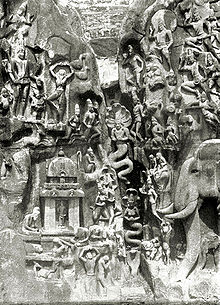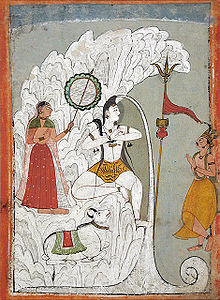- Bhagiratha
-
"Bhageeratha" redirects here. For the film, see Bhageeratha (film).
Bhageeratha (Sanskrit: भगीरथ, bhagīratha) was a great king in Hindu mythology who brought the River Ganges to Earth.
Contents
Early life
Bhageeratha was the king of Kosala, a kingdom in ancient India. He was a descendent of the great king Sagara of the Suryavamsa, or Sun Dynasty. He was one of the forefathers of Lord Rama, of the Ramayana, the epic in which Bhageeratha's tale is primarily recounted.
He lost his father when he was just a child, and was raised by his mother. Bhageeratha was very intelligent, virtuous and kind hearted. When he came of age, Bhageeratha ascended to the throne of the kingdom of Kosala, today located in the Indian state of Uttar Pradesh. He was a pious, benevolent ruler who adhered to his duties as a king as prescribed by dharma.
Bringing the Ganges to Earth
Kapila's curse
When king Sagara chose to perform the Ashwamedha yagna, his royal agents lost track of the sacrificial horse. Sagara ordered his sixty thousand sons by Sumati to track down the horse. The proud and mercurial princes raged across Bharat, burning down forests and uprooting life and property to find the horse. They finally arrived at a quiet spot where the Sage Kapila was sitting in meditation. Besides him was tied the white horse. The enraged princes condemned Kapila as a thief and attacked him. Using his terrible mystic power, Kapila instantly turned the princes into ashes.
Another version has it that the horse was stolen by a jealous Indra who did not want the yagna to succeed, and hid it in cave where sage Kapila was meditating in order to escape being accused of the stealth.
One version has it that Kapila told the prince Anshuman, Sagara's grandson(Son of Asamanjan, other son of Sagara who was thrown out of kingdom by him) who had come looking both for the horse and his brothers, that the only way for the souls of the dead princes to ascend to heaven would be through the offering of niravapanjali with the water of the sacred Ganga (Ganges) river, which was flowing only in Swarga.
Another version has it that Anshuman was told about the fate of his 60,000 uncles and about relief from Kapila's curse (by Ganga's waters) by Garuda.[citation needed]
Bhageeratha's tapasya
 "Bhageeratha's Penance", Relief at Mahabalipuram.
"Bhageeratha's Penance", Relief at Mahabalipuram.
Bringing Ganga back to Earth was a near impossible task and required many years to be spent in tapasya and prayer. The Kosala kings of successive generations could not do this while managing their duties as kings. As a result, the sins of the thousand princes multiplied in their destructive energy, and began resulting in natural disasters. The kingdom began to lose its peace and prosperity, and by the time Bhageeratha ascended the throne, he found it impossible to attempt to govern in this situation, that had only one solution.
Turning over the kingdom to trusted ministers, Bhageeratha set off to the Himalayas to perform an arduous tapasya in the extreme climate. For one thousand years, he performed an excruciatingly harsh penance to please Lord Brahma. At the end of the thousand years, Brahma came to him and told him to ask for anything. Bhageeratha asked Brahma to bring down the river Ganges to earth so that he may perform the ceremony for his ancestors.
Brahma asked Bhageeratha to propitiate Lord Shiva, for only He would be able to break the Ganga's fall. It was the largest river, and it would be impossible for anyone save Him to contain the destructive impact of this event.
Bhageeratha performed a tapasya for Lord Shiva, living only on air. The compassionate Shiva appeared only after a year's penance, and told Bhageeratha he should not have to perform tapasya to accomplish a noble goal such as this. He assured Bhageeratha that he would make Ganga fall.
Ganga's fall
After eons of being flattered and praised by the Devas, Ganga had become vain. She scoffed at Brahma when He asked her to flow down to earth, but could not disobey him as he was her father.
But Ganga was sure, as much as Bhageeratha was afraid that no one could stop her fall, which would devastate the earth for a long time. As she cascaded across and down from Swarga, Bhageeratha and celestial observers were terrified of the roar and volume of water coming down. But Lord Shiva appeared from out of nowhere and captured all of Ganga just as she launched herself onto earth, in His jata.
Ganga struggled to set herself free, but Shiva could not be budged. Bhageeratha worshipped Shiva, who let Ganga free after crushing her vanity. She flowed, and is still believed to flow, from Shiva's jata down to earth at a gentler pace.
Establishment of the river
King Bhageeratha led the way for Ganga on his chariot, and she followed him across the north and east of Bharat and finally merging with the ocean. In her course she washed the ashes of Sagara's sixty thousand sons, who ascended to heaven while praising and blessing Bhageeratha.
Commemoration
For its descent to Earth being owed to Bhageeratha's efforts, Ganga is also known as Bhageerathi (daughter of Bhageeratha) as proclaimed by Lord Brahma.
Bhageeratha's own great effort was praised by all the Gods and his ancestors, and is known as a Bhageeratha Prayatna, as proclaimed by Lord Brahma. It is a great inspiration to any man who seeks to do something noble despite facing overwhelming odds.
See also
- The Ramayana (2001) by Ramesh Menon
- http://moralstories.wordpress.com/2006/05/14/hard-work-can-do-wonders/
- Dictionary of Hindu Lore and Legend (ISBN 0-500-51088-1) by Anna L. Dallapiccola
- Bhagrathi community (Western UP)
- The story of Baghiratha in western edition
Hindu deities and texts Gods 
Goddesses Texts Categories:- People in Hindu mythology
Wikimedia Foundation. 2010.

